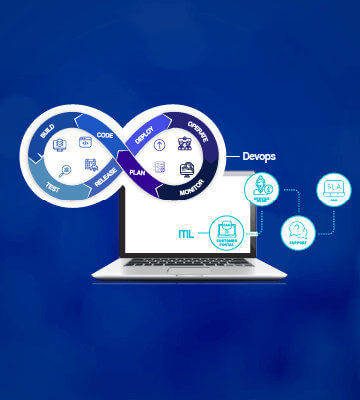Kubernetes Orchestration tool

Kubernetes, aka K8, is a solution we simply love using, there is no other like it. Kubernetes is an open-source container orchestration platform used for managing, deploying and scaling containerized applications and services. It has been founded based on Google’s experience and innovative ideas from the community resulting in it being precise and truly useful.
What we particularly like about it, is that it makes a great difference when it comes to efficiency, allowing for shortened software development cycles and improving resource utilization, meaning cost-optimisation. The Kubernetes ecosystem is ever-growing and it works with all the main public cloud provides AWS, Azure and GCP.
What is it best for? It comes in extra handy when you need to scale your resources and when you have several containers to manage.
We like to sync Kubernetes with popular and reliable monitoring tools such as Datadog and VMware.
Terraform - maintain infrastructure as a code

To fully take advantage of infrastructure as a code paradigm with Terraform it’s recommended to store and version code in source version control tools such as Git, Mercurial or SVN.
AWS

AWS offers over 200 services, including Amazon EC2, Amazon RDS, Amazon Simple Storage Service (S3), Amazon CloudFront and Amazon VPC.
AWS is aimed at all types and sizes of organizations with the focus to provide cost optimization, agility and room for innovation. When it comes to costs, we love that it offers on-demand services meaning you only use the resources in the given time with a possibility of a pay-as-you-go payment plan.
Azure

GCP
Google Cloud Platform (GCP) is the third of the three main cloud providers. Alike AWS and Azure, GCP helps with
achieving work efficiency and cost-effectiveness.
It helps you modernize your infrastructure and applications. Currently, GCP offers 100 different services in comparison
to over 200 services offered by AWS.
GCP three main services are Google App Engine, Google Compute Engine, and Google Kubernetes Engine.
Docker Containerization engine
 Docker is one of the most crucial platforms when it comes to building, testing and deploying applications fast and
effectively. We use it with pride, knowing it collaborates with AWS making faster and smoother delivery of the
applications.
Docker is one of the most crucial platforms when it comes to building, testing and deploying applications fast and
effectively. We use it with pride, knowing it collaborates with AWS making faster and smoother delivery of the
applications.
Utilising Docker is based on using containers and consists of everything we may need for fast deployment and scaling applications into any environment. Using it together with AWS means we can achieve reliable, fast and cost-effective building, shipping and running of the applications.
Jenkins Automation tool

The main benefits of Jenkins include a very wide range of plug-ins (over 400) helping with project building and testing, it is widely used by a large community meaning it’s easier to get a second opinion and share the knowledge and it is ongoing developed.
Prometheus Grafana Loki Stack
 Prometheus is an open-source time-series database designed for monitoring. It comes with the alert manager - an alerting
platform. It collects and processes metrics by scraping them, including the numeric information of the infrastructure
platform, applications and services.
Prometheus is an open-source time-series database designed for monitoring. It comes with the alert manager - an alerting
platform. It collects and processes metrics by scraping them, including the numeric information of the infrastructure
platform, applications and services.
Grafana is an open-source visualisation platform that presents metrics collected by Prometheus in highly customizable dashboards. Loki is a log aggregation tool that collects and labels logs from disturbed systems. It’s a popular choice for log management tools in a microservices architecture. Three tools combined together increase observability and gives valuable insights about application and infrastructure performance.
Metrics and logs are crucial information for any organization and understanding the performance of the application by monitoring is a key element in succeeding.
GitHub - source version control based on Git
![]() GitHub is an encyclopedia for your code version storage.
It is a space for a version control system for the written code, where the developers can not only store their versions
but also share with like-minded developers and benefit from insight into other developers’ work.
GitHub is an encyclopedia for your code version storage.
It is a space for a version control system for the written code, where the developers can not only store their versions
but also share with like-minded developers and benefit from insight into other developers’ work.
Essentially, GitHub is a development platform where like-minded developers can build, ship and store their software and code versions, share the knowledge and exchange findings.
Ansible software provisioning
Ansible is a handy open-source DevOps automation tool, used for configuration management, application deployment automation, and provisioning. It has been developed by Red Hat, it enables writing infrastructure as code (IaC) and automates the configuration of CI/CD pipelines, thus increasing time efficiency.
One of the main benefits of Ansible is that it allows for a faster deployment process and builds more resilient applications.
DataDog monitoring and analytics tool as a service

We love it for precisely outlining the performance metrics, with the focus on monitoring the infrastructure, logs and application performance as well as cloud services including the servers, databases and tools.
DataDog can be used by all types and sizes of companies. It helps in cloud migration, digital transformation and collaboration between the teams. With the app, you get real-time observability of the technology stack, speed up the time to market for the applications and reduce problems fixing time. Most importantly, thanks to the platform you can understand your customers’ behaviour and observe the KPIs and other business metrics.
Bitbucket - another source version system

Bitbucket has been written in Python, it has enterprise-grade security features and it has strong integration with Jenkins and Jira.
Bitbucket allows for more flexibility in certain areas, in comparison to GitHub. It also offers a possibility to have a wiki per every repository meaning all the notes can be kept within the platform and handy during the dev cycle.
Jira - tracking and project management application

Jira is the best friend of Agile teams. What’s great about it is that it helps to identify and understand issues particular to the work that you do. Jira works great with AWS and monitoring tools, for example, Datadog.
One of the great perks of Jira is its outstanding traceability, meaning everyone involved in the project can track the progress of the individual tasks, the pace of the project as well as bugs and other issues throughout the software development lifecycle. This means cost optimisation, reduced delays and more effective test management when it comes to testing the requirements.
Slack
Slack is simply a great communication tool, making remote work easier and more effective. It allows for efficient
real-time communication.
Although it is not a DevOps tool, it is a communication tool that works great for DevOps teams. We find it easy to
navigate, very useful when it comes to keeping in touch, and rich in its features including creating specific group
channels, direct messages and video calls.
Primetric time allocation and resource management tool




 CI/CD in DevOps - definition of continuous integration and deployment and best CI/CD tools
CI/CD in DevOps - definition of continuous integration and deployment and best CI/CD tools
 What’s the goal of DevOps methodology?
What’s the goal of DevOps methodology?
 What is DevOps?
What is DevOps?